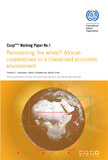| dc.description.abstract | Cooperative development in Africa can be said to have traversed two main eras: the
era of state control and that of liberalization. The first era lasted up to the early 1990s
and saw the origin and substantial growth of cooperatives on the continent. During
that period, different models of cooperative development were introduced on the
continent. We distinguish a unified cooperative model, a social economy model, a
social movement model, a producers’ model and an indigenous model. But in all
cases, cooperatives were engulfed into state politics. However, little is known about
the impact of liberalization measures on these models. Our research in 11 African
countries reveals that cooperatives in Africa have survived the market forces and
continued to grow in number and membership. We see a slow but sure erosion of
the unified model and the adoption of a social economy model. Cooperatives in
Africa are re-examining their organizational forms and diversifying their activities
in response to members’ interests and needs. | en_US |

